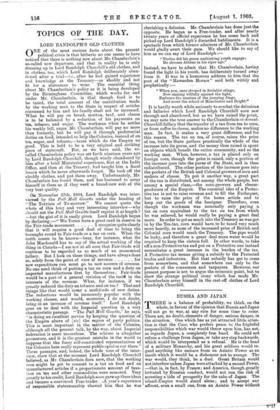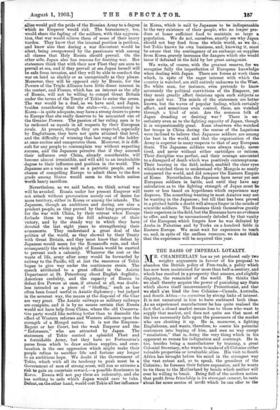RUSSIA AND JAPAN. T HERE is a balance of probability, we
think, on the whole, in favour of the opinion that Russia and Japan will not go to war, at any rate for some time to come. There are, no doubt, elements of danger, serious danger, in the situation. One which has as yet attracted little atten- tion is that the Czar, who prefers peace to the frightful responsibilities which war would throw upon him, has not, as regards Japan, a completely free hand. He could not refuse a challenge from Japan, or take any step backwards, which would be interpreted as a refusal. He is the head of a military Monarchy, and his great soldiers would re- gard anything like menace from an Asiatic Power as an insult which it would be a dishonour not to avenge. The war would, they think, be a duel. Great Britain would not interfere unless Japan were attacked by a second Power, —that is, in fact, by France; and America, though greatly irritated by Russian conduct, would not run the risk of arresting a tide of prosperity for the sake of Japan. The island-Empire would stand alone ; and to accept any affront, even a small one, from an Asiatic Power without allies would gall the pride of the Russian Army to a degree 'which no Emperor would risk. The bureaucracy, too, • would share the fepling of the soldiers, with this aggrava- tion, that war would relieve them of some of their heavy burden. They know that the internal position is perilous, and know also that during a war discontent would be - silent, being overpowered by the passionate wish among all classes that Holy Russia should prevail. On the other side, Japan also has reasons for desiring war. Her statesmen think that with their new Fleet they are sure to prevail at sea, and if they prevail at sea Japan herself will be safe from invasion, and they will be able to conduct the war on land as slackly or as energetically as they please. Moreover, they will be opposed only by Russia, for the Powers of the Triple Alliance have little direct interest in the contest, and France, which has an interest as the ally of Russia, will not be willing to compel Great Britain under the terms of the Treaty of Tokio to enter the arena. The war would be a duel, as we have said, and Japan, besides considering that the stake—viz., ascendancy in • Korea—is quite adequate, may have a strong desire to prove to Europe that she really deserves to be accowited one of the Greater Powers. The passion of her ruling men is to be reckoned as equals in all respects by their European rivals. At present, though they are respected, especially by Englishmen, they have not quite attained that level, and the difficulty of winning that last rung of the ladder at once excites and exasperates them. Moreover, it is diffi- cult for any people to contemplate war without expecting success, and the Japanese perceive that if they succeed their influence over China, already considerable, will become almost irresistible, and will add to an incalculable -degree to their influence and position in the world. The Japanese are a vain as well as a patriotic people, and a chance of compelling Europe to admit them to the first grade among States would seem to the whole nation worth heavy sacrifices.
Nevertheless, as we said before, we think actual war will be avoided. Russia under her present Emperor will not attack without provocation merely out of desire for more territory, either in Korea or among the islands. The Japanese, though an ambitious and daring, are also a prudent people, as they proved by their long preparations for the war with China, by their retreat when Europe forbade them to reap the full advantage of their victory, and by the steady way in which they have devoted the last eight years ,to strengthening their armaments. They understand a great deal of the politics of the world, as they showed by their Treaty with Great Britain, and they must know that defeat by Japanese would mean for the Romanoffs ruin, and that consequently the whole might of Russia would be exerted to prevent such a calamity. Whatever the cost or the waste of life, army after army would be forwarded by railway to the Pacific, till at last the resources of Tokio began to give way under the continuous strain. The speech attributed to a great official in the Asiatic Department at St. Petersburg about English duplicity, American credulity, and the capacity of Russia to defeat five Powers at once, if uttered at all, was doubt- less intended as a piece of "bluffing," such as has often been found useful in Asiatic diplomacy ; but judged in the severest way, the means at the disposal of the Czar are very great. The Asiatic railways as military railways are complete, and it is by no means certain that Russia would not have help from China, where the old Conserva- tive party would like nothing better than to discredit the effect of Western reforms and Western alliances upon the strength of a Mongol nation. It is not the Empress- Regent or her Court, but the weak Emperor and the "Reformers," who are attracted by Japan. The statesmen of Tokio control a splendid Fleet and a formidable Army, but they have no Fortunatus's purse from which to draw endless supplies, and over- taxation is the one oppression which might make their "people refuse to sacrifice life and fortune any longer to an ambitious hope. We doubt if the Government of Tokio, which with all its tendency to push must be a Government of men of strong sense, will run so extreme a 'risk to gain an uncertain reward,—a possible dominance in Korea. Russia will not pay them an indemnity, and she has nothing to cede which Japan would care to take. Defeat, on the other hand, would cost 'Tokio all her influence . _ in Korea, which is said by Japanese to be indispensable to the very existence of their people, who no longer pro- duce at home sufficient food to maintain so large a population. We do not, ourselves, exactly see why Ja should not buy food from the whole world, as we • . , but Tokio knows its own business, and, knowing it, must be aware that the contingency of an embargo on supplies from Korea gravely increases the dangers which she would incur if defeated in the field by her great antagonist.
We write, of course, with the greatest reserve, for we recognise fully the imperfection of European knowledge when dealing with Japan. There are forces at work there which, in spite of the eager interest with which the country is watched, are still entirely unknown to the West. No white man, for instance, even pretends to know accurately the political convictions of the Emperor, yet they must greatly affect decisions upon such subjects as peace and war. The minds of the statesmen are better known, but the waves of popular feeling, which certainly affect, and sometimes even control, them, are watched through a kind of mist. Are the common folk of Japan dreading or desiring war ? There is un- certainty even as to the fighting capacity of Japan, though it is unquestionably great. Keen observers who watched her troops in China during the rescue of the Legations were inclined to believe that Japanese soldiers are among the best in the world, and that the organisation of the Army is superior in many respects to that of any European State. The Japanese soldiers were always ready, never tired, and never without either cartridges or rations. Their discipline was perfect, and their courage amounted to a disregard of death which was positively contemptuous. Their bearing in the field, indeed, enabled the clear eyes which watched them to understand why Mongols so nearly conquered the world, and did conquer the Eastern Empire of Rome. Nevertheless, the Japanese have never yet met European soldiers in battle, and until they have any calculation as to the fighting strength of Japan must be more or less based on hypotheses which experience may disprove. The something wanting in most Asiatics may not be wanting in the Japanese ; but till that has been proved in a pitched battle a doubt will always linger in the minds of scientific soldiers. The Russians think themselves greatly their superiors in the field, but the Russians have no evidence to offer, and may be unconsciously deluded by that vanity of the European which forgets how he was defeated by Arabs in Palestine and by Turks on a hundred fields in Eastern Europe. We must wait for experience to teath us, and, in spite of the endless rumours, we do not think that the experience will be acquired this year.







































 Previous page
Previous page